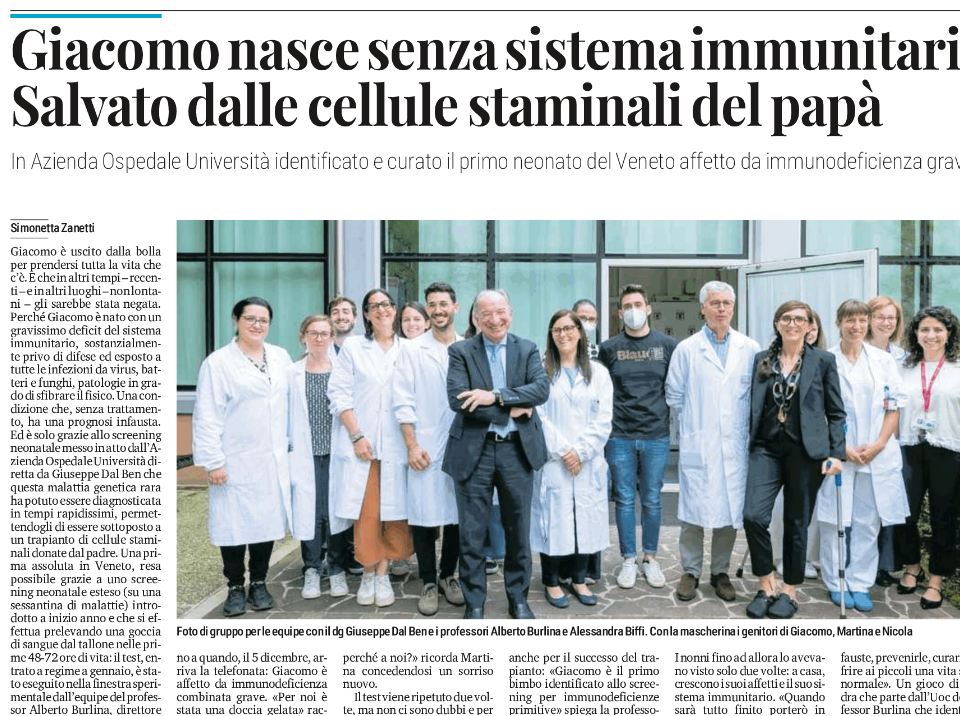Muore a 6 anni per una malattia metabolica
25 Giugno 2005Domenica concerto di Cheryl Porter
1 Luglio 2005G6PD Deficiency
“KidsHealth.org Tue Jun 28, 8:00 PM ET
To understand G6PD deficiency – a type of metabolic disorder – you will first need to know a little about what metabolism is and how enzymes play an essential role in it. Metabolism is a series of chemical processes through which the body uses the nutrients in food to produce the energy it needs. The body requires energy as fuel to perform its most basic functions: movement, growth, maintenance of healthy tissues, and removal of wastes. Throughout each day, metabolism involves thousands of chemical reactions that are necessary for life.
Cells produce special substances called enzymes that regulate most chemical reactions in the body. The body needs enzymes so its metabolism can function properly. A child born with a metabolic disorder usually inherits a genetic mutation – a change in a gene – that creates problems with a particular enzyme. That enzyme’s activity may change or stop completely, altering one of the metabolic pathways that take place in the body. As a result, a certain key substance, such as a carbohydrate, sugar, fat, or protein, is not processed correctly. In this way, deficient enzymes affect the body’s metabolic balance, which can lead to health problems that are sometimes serious.
What Is G6PD Deficiency?
Glucose-6-phosphate dehydrogenase , or G6PD, is just one of the many enzymes that affect cell metabolism. G6PD is produced by red blood cells and helps the body process carbohydrates, turning them into energy. Normal functioning of G6PD is also important to the body because it protects the red blood cells from the stress of oxidizing substances. These are potentially harmful byproducts that are created when certain medications are taken or when the body’s immune system is working hard to fight infection.
Normally, G6PD works to “neutralize” oxidative substances and protect cells from what is referred to as oxidative stress. Without enough normal G6PD to help red blood cells get rid of harmful oxidative substances, they can be damaged or destroyed, leading to a condition known as hemolytic anemia. In a process called hemolysis, red blood cells are destroyed prematurely, and the bone marrow (the soft, spongy part of the bone that produces new blood cells) cannot keep up with the body’s need for new cells. G6PD deficiency is often classified according to how severe a child’s hemolytic reaction is, with classes 1 and 2 being the most severe, class 3 being mild, and class 4 not causing any symptoms at all.
About 400 million people worldwide have G6PD deficiency, making it the most common inherited enzyme deficiency. In those who are born with it, either the red blood cells do not make enough of the enzyme or the G6PD produced is altered and cannot function properly.
Under normal circumstances, G6PD deficiency usually does not cause problems for most children. However, it can become a problem when children develop an illness or infection, when they take certain medications, such as pain medicines, certain antibiotics, and drugs to treat malaria, or when they are exposed to other specific substances, such as mothballs or fava beans. All of these things increase the amount of oxidative stress on the body’s red blood cells.
What Causes G6PD Deficiency?
G6PD deficiency is inherited, or passed along from one or both parents to a child in genes. The parent may have the condition or simply carry the gene for it. It is an X-linked, recessive condition, meaning that the gene responsible for this deficiency is on the X chromosome. This explains why many more boys than girls have G6PD deficiency: Girls have two X chromosomes, so there’s a good chance that if they inherit the mutated gene that leads to G6PD deficiency from one parent, they will not inherit it from the other, leaving one of their X chromosomes unaffected. The normal gene on the unaffected chromosome essentially balances out the defect. Because boys have only one X chromosome, the mutation on that chromosome will cause the condition.
Although the condition has been found in most groups of people, it is most common in African-American males, with as many as one in 10 in the United States affected. Many African-American females are carriers of G6PD deficiency, meaning they can pass the gene for the deficiency on to children but do not have symptoms, a few African-American women – those who inherit a faulty gene from each parent – are actually affected by the deficiency.
People of Mediterranean heritage, including Italians, Greeks, Arabs, and Sephardic Jews, are commonly affected as well. The severity of G6PD deficiency varies among these groups. The condition tends to be milder in African Americans and more severe in people of Mediterranean descent.
Why does G6PD deficiency occur more often in certain groups of people? It is known that Africa and the Mediterranean basin are high-risk areas for the infectious disease malaria. Researchers have found evidence that the parasite that causes this disease does not survive well in G6PD-deficient cells. So they believe that the deficiency may have developed as a protection against malaria.
“




